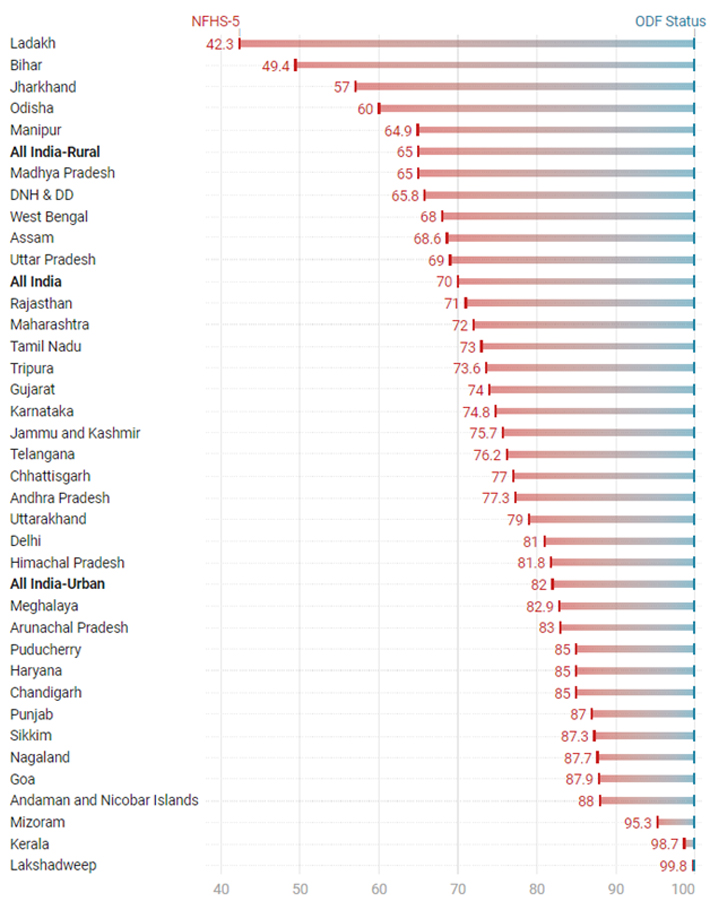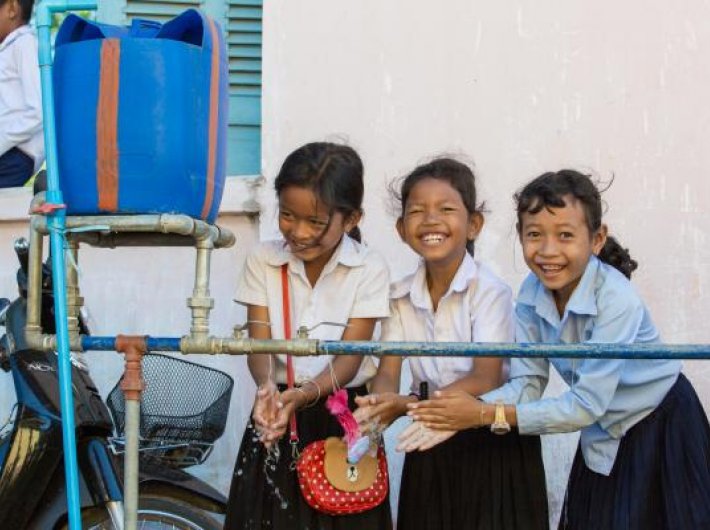Appropriate budgetary accounting for key issues will improve adoption of toilets, effective SLWM and handwashing, aiding the fight against COVID-19 and overall improvement in health outcomes.
Why sanitation in budget 2022-23 is important?
The upcoming budget 2022-23 will be of significant value as India is in the middle of the third wave of the pandemic. The budget presents an opportunity to aid the specific sectors of the economy to recover as well as combat the severity of the potential upcoming waves of COVID-19. In doing so, we propose that ‘Water, Sanitation and Hygiene’ (WASH) ought to remain in critical focus as research has shown that regular handwashing is one of the most cost-effective ways to contain the spread of infection and is considered the first line of defence against COVID-19. Similarly, the WHO’s COVID-19 guidelines stress the safe management of drinking water and wastewater from faecal waste as these have been shown to reduce the spread of the virus. Against this backdrop, we discuss the scope for budgetary outlay for two key WASH-related programs undertaken by the government: Swachh Bharat Mission (SBM) and Jal Jeevan Mission (JJM).
Budget allocation in 2021-22
In the budget 2021-22, SBM 2.0, which emphasizes solid and liquid waste management (SLWM), or more specifically, faecal sludge management, waste-water treatment, reduction in single-use plastic and source segregation of garbage, was granted an outlay of Rs 1.41 lakh crore from 2021 till 2026. The government also launched the Jal Jeevan Mission (JJM) which aimed to provide tap water in all the 4,378 urban local bodies. This mission was allocated Rs 2.87 lakh crore for the next five years. These outlays were significantly higher than the previous budgets and their provision was justified as a prerequisite to achieving health for Indian citizens.
Brief on programs and their progress
In the first phase of SBM (2014-2019), over 11 crore toilets were built in the five years, ensuring access to toilets to every household and making the country open-defecation free (ODF). While India has been declared an ODF country, challenges like faulty drainage and inefficient management of faecal sludge continue to plague the sanitation sector across India, prompting the launch of SBM 2.0. The program focuses on SLWM, for instance, wastewater is to be safely contained, collected, transported and treated while ensuring zero pollution of the waterbodies. While the progress report on more recent statistics is awaited from the respective ministries, the Standing Committee on Urban Development (2021) expressed concern over the slow pace of completing targets, as adequate source segregations and waste processing were achieved in only 78% and 68%, respectively, of the targeted wards.
Coming to drinking water, access to tap water connection was as low as 17% of rural Indian households in 2019 and hence motivating the launch of JJM on August 15, 2019. After two years, as on October 2021, 43% of the rural households now have a tap water supply in their homes with states and UTs like Goa, Haryana, Telangana, A&N Islands, Daman & Diu and Dadra & Nagar Haveli, Puducherry now providing 100% tap water access to its households.
Despite the immense progress, India still has a long way to go. Recognition and elucidation of these areas will help the policymakers plan the budget accordingly.
What’s missing?
While India has been declared ODF, nationally representative surveys like NHFS-5 point to the contrary. Only two states Kerala and Lakshadweep are close to achieving the target of 100% ODF status, while rural India lags significantly behind the national average and urban areas (see Figure). While the SBM concentrated on building the sanitation infrastructure, this availability did not translate to usage. Common barriers include social norms, reluctance to quit the habit of OD or people abandoning toilets due to poor quality and water supply issues. While the second phase has rightfully initiated a campaign towards SLWM, future sanitation efforts should also include discreet budgetary outlays for information, education and awareness (IEC) campaigns and toilet maintenance. This will safeguard the timely shift from access to adoption of toilets.

Figure 1: Percentage of population living in households that use improved sanitation in India.
The SBM 2.0 dashboard exhibits the number of villages that are declared ODF+ (i.e., achieved ODF status and SLWM). Besides this, new yardsticks for measuring the progress can be included, for instance, monitoring the pollutant load in the soil and groundwater or surface water could be more informative.
Finally, as is prescribed by WHO, regular handwashing with soap is the most cost-effective method to break the chain of transmission. NSS 2019 reports that only 36% of the households in the country practice handwashing with soap or detergent before having a meal. We suggest that JJM, along with the provision of in-house tap water, should also include a provision of (subsidized or free) soap for handwashing.
Way forward?
Budget 2022-23, in line with the previous budget, should also acknowledge the significance of the WASH sector, especially in the light of multiple waves of COVID-19. Even though India has made substantial progress through SBM and JJM, the upcoming budget also needs to reflect on the following:
(1) Higher investment in IEC and toilet maintenance will ensure that access to toilets translates to adoption,
(2) A review of measurement outcomes for SLWM will make the progress transparent for the citizens, and
(3) Access to tap water connection when complemented with a bar of soap will break the chain of transmission.
Appropriate budgetary accounting for these issues will improve adoption of toilets, effective SLWM and handwashing, aiding the fight against COVID-19 and overall improvement in health outcomes.
Payal Seth is a PhD Scholar at Bennett University. Palakh Jain is an associate professor at Bennett University.
